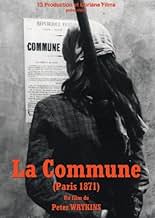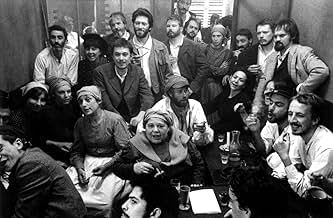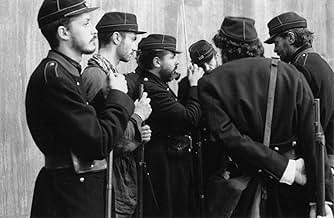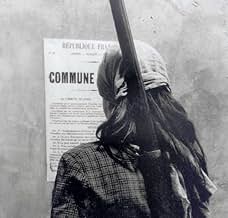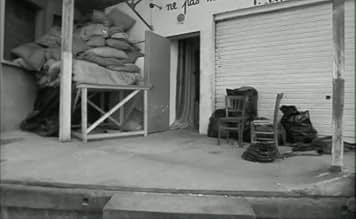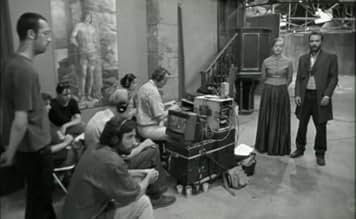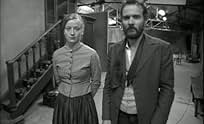La commune (Paris, 1871)
- 2000
- 5h 45min
NOTE IMDb
8,0/10
1,4 k
MA NOTE
Dans ce drame de guerre qui gomme la frontière entre documentaire et fiction, la classe ouvrière et la bourgeoisie parisiennes du 19e siècle sont interviewées et filmées par la télévision, a... Tout lireDans ce drame de guerre qui gomme la frontière entre documentaire et fiction, la classe ouvrière et la bourgeoisie parisiennes du 19e siècle sont interviewées et filmées par la télévision, avant et pendant un soulèvement d'ouvriers tragique.Dans ce drame de guerre qui gomme la frontière entre documentaire et fiction, la classe ouvrière et la bourgeoisie parisiennes du 19e siècle sont interviewées et filmées par la télévision, avant et pendant un soulèvement d'ouvriers tragique.
- Réalisation
- Scénario
- Casting principal
- Récompenses
- 1 victoire et 1 nomination au total
Avis à la une
I don't think this is Peter Watkins's "best" film, exactly. It lacks the discipline and precision of "Edward Munch." But this is the purest example of the potential of Watkins's practice. Few films I've ever seen have felt as alive as a collaboration between a director and a group of performers. The non-actors, denizens of a working-class neighborhood of Paris, lived together and collaborated with Watkins as a legit, studio-based commune during their re-enactment of the events of Paris, 1871. In the film's second half, the reenactment subtly starts to occasionally give way to conversations between the performers during the course of the production. The past starts to seem truly "re-enacted," as the "present" seems to become part of a work of historical story-telling. In the final scenes, the actors seem to go into a kind of trance of fury as they sing revolutionary songs while awaiting to defend the city from Versailles' soldiers. Many turn to the camera and say that they would pick up guns to fight for a new commune in the present. As a viewer, I believed them.
This film also goes farther in its critique of media than Watkins' earlier films. All of Watkins's films feature a contemporary documentary camera crew interviewing historical figures in a way that is quite confrontationally unnatural. In the previous films, the (seemingly) Watkins-led camera crews were portrayed as the allies of "the people." Here, the larger canvas allows for a more nuanced critique of even "people's media." Two media outlets vie for the hegemony of the viewer: Versailles News and Commune TV. Even Commune TV, the "ragtag, independent" news outlet is presented as always veering towards the most relatively conservative seats of power. The Commune reporters consistently defend the (I think rather inappropriately maligned) "professional" Commune leadership from the masses. (As much as I admire Watkins, he is undeniably an ultra-leftist.) I wonder, however, if this more complex take on the media is not tied to the more complex layerings of "realities" in this work that I discussed in my first paragraph. For, unlike, in the earlier films, here the "progressive" media outlet (Commune TV) is not the "highest" reality, and therefor is not directly attached to Watkins himself. It is only part of the historical fiction that Watkins implements to show his performers embrace the political heritage of the Commune. In the scenes where the performers discuss their experiences of the production with each other, Watkins name is only ever mentioned with reverence. The filmmaker deepens his critique of media, but not of his place within it as a "radical saint."
This film also goes farther in its critique of media than Watkins' earlier films. All of Watkins's films feature a contemporary documentary camera crew interviewing historical figures in a way that is quite confrontationally unnatural. In the previous films, the (seemingly) Watkins-led camera crews were portrayed as the allies of "the people." Here, the larger canvas allows for a more nuanced critique of even "people's media." Two media outlets vie for the hegemony of the viewer: Versailles News and Commune TV. Even Commune TV, the "ragtag, independent" news outlet is presented as always veering towards the most relatively conservative seats of power. The Commune reporters consistently defend the (I think rather inappropriately maligned) "professional" Commune leadership from the masses. (As much as I admire Watkins, he is undeniably an ultra-leftist.) I wonder, however, if this more complex take on the media is not tied to the more complex layerings of "realities" in this work that I discussed in my first paragraph. For, unlike, in the earlier films, here the "progressive" media outlet (Commune TV) is not the "highest" reality, and therefor is not directly attached to Watkins himself. It is only part of the historical fiction that Watkins implements to show his performers embrace the political heritage of the Commune. In the scenes where the performers discuss their experiences of the production with each other, Watkins name is only ever mentioned with reverence. The filmmaker deepens his critique of media, but not of his place within it as a "radical saint."
Peter Watkins stands at the base of a form of historical documentaries known as 'documentary reconstruction'. Lightly based on battle re-enactments, Watkins hires amateur actors to play the roles of common people in the Paris of 1871. Famine and civil unrest cause a popular revolution, supported by followers of Karl Marx. The people take power and form a Commune, a communist government. After a few weeks, the official Versailles government regains the city by force, and tens of thousands of people are executed.
Watkins' historical drama is based on the common people, which are shown in their everyday life. To do this, he introduced an anachronism: in the 1871 context, the people form a tv station. The Versaillais also have their official tv station. This way, the documentary becomes both a social project and a media experiment.
Watkins' historical drama is based on the common people, which are shown in their everyday life. To do this, he introduced an anachronism: in the 1871 context, the people form a tv station. The Versaillais also have their official tv station. This way, the documentary becomes both a social project and a media experiment.
Once again, the National Gallery of Art film program has brought us another film we are unlikely to see at any other theater. This is an uneven but ultimately fascinating look at a relatively unknown period in French history, the 1871 Communard revolution in Paris right after the Franco-Prussian War. The filmmaker uses non-professional actors who were also allowed to be co-producers and to write their own lines to some extent. It is shot in black and white and on Beta Digital tape. The film technique reminds me of an old TV program from the 1950s' called "You Are There" in which today's media looks back on history and even interviews the participants in the historical drama.
The film is very slow going which gives the viewer a total feeling of both being there right in the action on a day to day basis while looking down on it from afar. We live the everyday life of the people in Paris during this short period of 2 1/2 months. At some points, the actors stop the action and comment on their involvement in the making of the very film they are in. Also, they and the filmmaker comment on globalization and peoples' rights in today's world. History is brought forth into our present time and we see that all events in human history are more alike than they are different.
This film is not for the average movie-goer. It is for a small audience of patient students of history and politics. It fascinated me but also tried that patience quite often. I would recommend not attempting to view this film without being well rested. It is in two parts of three hours each. Frankly, the filmmaker could have cut this down and still had a powerful history lesson for all of us.
The film is very slow going which gives the viewer a total feeling of both being there right in the action on a day to day basis while looking down on it from afar. We live the everyday life of the people in Paris during this short period of 2 1/2 months. At some points, the actors stop the action and comment on their involvement in the making of the very film they are in. Also, they and the filmmaker comment on globalization and peoples' rights in today's world. History is brought forth into our present time and we see that all events in human history are more alike than they are different.
This film is not for the average movie-goer. It is for a small audience of patient students of history and politics. It fascinated me but also tried that patience quite often. I would recommend not attempting to view this film without being well rested. It is in two parts of three hours each. Frankly, the filmmaker could have cut this down and still had a powerful history lesson for all of us.
I must admit, the first thing that caught my attention in the programme of Arsenal Movie Theatre was the length of the film - 345 min. I was intrigued and looked it up on the internet, starting with imdb, and became even more intrigued. So I saw the movie yesterday.
And I didn't regret it at all. (Although I had to struggle through German subtitles for the shorter German version of 300 min. The announced full one with English subtitles was stuck somewhere in Paris.)
It is probably one of the most unusual movies I've ever seen. It is even not really a movie, at least in the standard understanding of it (let alone the length of the thing). It is obviously a mind game, but a mind game so fine and intellectual, as well as passionate, thrilling and challenging, that it somehow makes you feel deeply involved in it emotionally, not forgetting for a single moment that it is a game and the whole idea is completely absurd.
Indeed, what can be more absurd than watching "breaking news" about Paris Commune of 1871, like we were all watching tv on 9.11 or when the war in Iraq was about to begin. "Versailles TV", "Commune TV". Journalists asking "What do you feel now? What hopes do you have now for the future of The Commune?". But all staged, actors sometimes telling the camera about the roles they are playing. Or discussing whether The Commune could have had future, or Russian revolution was successful despite Kronstadt uprising.
The shocking thing is that it feels real. Even though you perfectly understand that it can't. He's using the media and our perception of the media (which makes us question to what an extent can our senses be manipulated) as a frame for all the events happening and in a way alters our perception of history and of history happening now.
I'm still digesting the movie, it raises a lot of question and makes you think a lot. But I'm happy to know that Arsenal is planning Peter Watkins's retrospective. So Berliners will have a unique chance to see his other works. Which I'm looking forward to.
And I didn't regret it at all. (Although I had to struggle through German subtitles for the shorter German version of 300 min. The announced full one with English subtitles was stuck somewhere in Paris.)
It is probably one of the most unusual movies I've ever seen. It is even not really a movie, at least in the standard understanding of it (let alone the length of the thing). It is obviously a mind game, but a mind game so fine and intellectual, as well as passionate, thrilling and challenging, that it somehow makes you feel deeply involved in it emotionally, not forgetting for a single moment that it is a game and the whole idea is completely absurd.
Indeed, what can be more absurd than watching "breaking news" about Paris Commune of 1871, like we were all watching tv on 9.11 or when the war in Iraq was about to begin. "Versailles TV", "Commune TV". Journalists asking "What do you feel now? What hopes do you have now for the future of The Commune?". But all staged, actors sometimes telling the camera about the roles they are playing. Or discussing whether The Commune could have had future, or Russian revolution was successful despite Kronstadt uprising.
The shocking thing is that it feels real. Even though you perfectly understand that it can't. He's using the media and our perception of the media (which makes us question to what an extent can our senses be manipulated) as a frame for all the events happening and in a way alters our perception of history and of history happening now.
I'm still digesting the movie, it raises a lot of question and makes you think a lot. But I'm happy to know that Arsenal is planning Peter Watkins's retrospective. So Berliners will have a unique chance to see his other works. Which I'm looking forward to.
Truly exceptional film making really breaking down the barriers of what is storytelling and letting everything run free. Peter Watkins does what would seem the impossible, not only create a realistic re-enactment of the commune in Paris (just after the siege of the Prussians and the exile of the bourgeois to Versailles) using only an abandoned warehouse and 200 odd unemployed French citizens and illegal immigrants but also to on top of that add a detailed and amazing social experiment. Putting these people through this experience and then have them portray not only their 1871 characters but also themselves in the one film. To hear these people talk about life today and draw parallels between the film they are making and the lives they lead is quite invaluable information. And as if that alone wasn't enough there is the whole other element of the media and how sides are formed and why people believe what they do and how things are taught and passed down so that divides never seem to cease. The use of reporting and television and newspapers really give this film a whole other level from which to operate and constantly throughout the film one has to ask themselves "who do I believe, do I believe anyone" "why am i believing what this person says and not this person" then as if one hasn't had enough thinking to do already you then, like the cast, have to project forward to today and ask yourself who do i believe when it comes to the reporting of current events? Am I receiving an accurate picture of what is occurring? I don't think anyone who offers themselves up to this 6 hour masterpiece can look at the media in quite the same way. Once again I just have to say this film is without a doubt set to become a masterpiece to filmmaking and I urge anyone who happens to see it on a program for a festival or perhaps even on television to sacrifice those few hours, you wont be disappointed. Also is you are left in awe after its viewing as I was then look out for the Universal Clock- The Resistance of Peter Watkins, it acts as a sort of "making of" but is a film in its own right and gives insight to what it was like to be involved in the making of Le Commune Paris 1871
Le saviez-vous
- Versions alternativesIn December 2002 Peter Watkins started the editing of an abridged theatrical version. In a prologue he expresses his views on discovering that the production company, 13 Production, has financial links with the Lagardère Group (which sells Military Weapons through Matra), then he warns the audience about how much of the sequence shots and live debates from the original full-length movie have been lost in the process of reducing the running time by more than 2 hours to 3 hrs 1/2.
- ConnexionsFeatured in L'Horloge universelle : la résistance de Peter Watkins (2001)
Meilleurs choix
Connectez-vous pour évaluer et suivre la liste de favoris afin de recevoir des recommandations personnalisées
- How long is La Commune (Paris, 1871)?Alimenté par Alexa
Détails
Box-office
- Montant brut aux États-Unis et au Canada
- 5 340 $US
- Week-end de sortie aux États-Unis et au Canada
- 2 930 $US
- 6 juil. 2003
- Montant brut mondial
- 21 641 $US
- Durée5 heures 45 minutes
- Couleur
- Mixage
- Rapport de forme
- 1.66 : 1
Contribuer à cette page
Suggérer une modification ou ajouter du contenu manquant

Lacune principale
By what name was La commune (Paris, 1871) (2000) officially released in Canada in English?
Répondre

